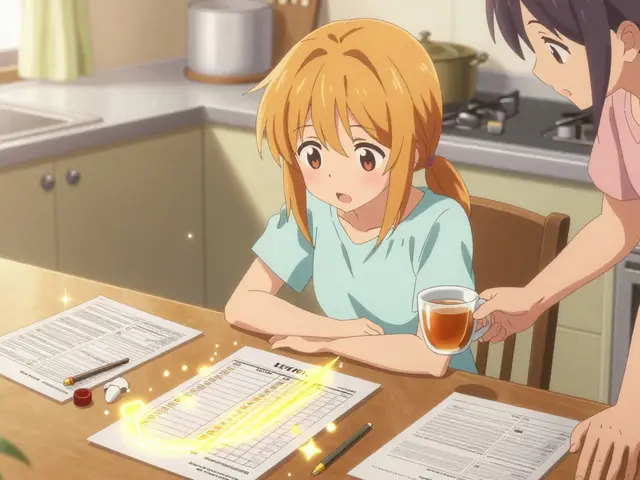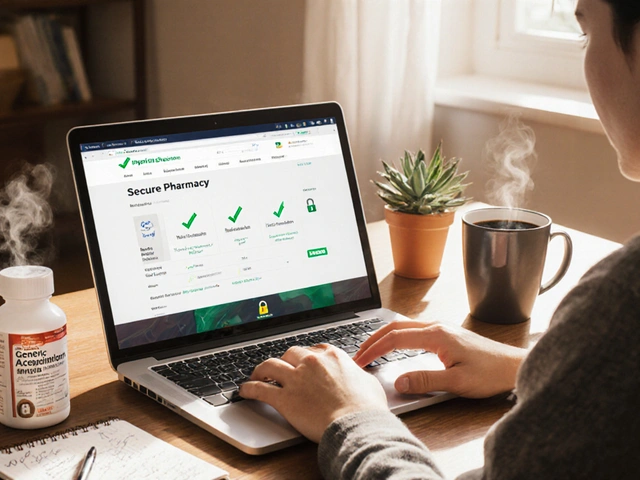Missing a dose of your blood pressure pill. Forgetting your insulin. Skipping your antidepressant because you feel fine today. These aren’t just small mistakes-they’re common, and they cost lives. About half of all people with chronic conditions don’t take their meds as prescribed. That’s not laziness. It’s not forgetfulness alone. It’s loneliness, confusion, fear, and feeling like no one else gets it.
Why Medication Compliance Isn’t Just About Memory
Taking pills on time sounds simple. But if you’re managing diabetes, heart failure, or depression, your regimen might include five or more drugs, each with different times, meals, and side effects. A 2023 study in Frontiers in Pharmacology found that people who stuck with their meds long-term didn’t just have better memory-they had better support. The real game-changer isn’t pill organizers or phone alarms. It’s knowing someone else has been there.Traditional advice-like handing out brochures or sending reminder texts-only works for a small group. The data shows peer-led support groups beat education-only approaches by a wide margin. One review found peer programs had nearly three times the impact on adherence compared to pamphlets. Why? Because people don’t change habits because they know better. They change because they feel less alone.
How Support Groups Actually Work
These aren’t therapy sessions. They’re practical, no-nonsense gatherings where people share what works. A typical group meets once or twice a week, with 8 to 12 members. Facilitators aren’t doctors-they’re patients who’ve been managing their condition for at least two years. They’ve lived through the nausea from chemo, the dizziness from blood pressure meds, the shame of forgetting doses in front of family.One member might say: “I started taking my statin after dinner instead of breakfast. It stopped my muscle cramps.” Another shares: “I keep my pills in my toothbrush holder. I see it every morning, and I don’t forget.” These aren’t clinical tips. They’re real-life hacks passed from person to person.
Programs like the American Heart Association’s Heart360 pair patients with peer mentors who’ve stabilized their own conditions. In one study, participants who joined these groups cut their missed doses in half within six months. One man with type 2 diabetes went from an A1c of 8.5% to 6.9%-not because his doctor changed his meds, but because he started talking weekly with someone who understood the struggle.
The Power of Family and Cultural Fit
It’s not just peers. Family involvement makes a huge difference. When a spouse reminds you to take your meds, checks your logbook, or cooks meals that match your diet plan, adherence jumps. A 2021 review found 11 out of 14 studies showed stronger results when family members were part of the process.But culture matters too. A 2022 study in BMC Health Services Research found African American patients in hypertension support groups were 35% more likely to stick with treatment when the group was led by someone from their own community. Language, food, religious beliefs, even how people talk about illness-all of it affects whether someone feels safe sharing.
One woman in Adelaide told me her group was the first place she could say, “I don’t take my pills because I’m scared of gaining weight,” without being judged. That kind of honesty doesn’t happen in a 10-minute doctor’s visit. It happens when someone else nods and says, “I felt the same way. Here’s what I did.”

What Makes a Program Effective
Not all groups are created equal. The difference between success and failure often comes down to structure. Programs with facilitators who’ve had at least 40 hours of training are 37% more effective than those with less. Why? Because good facilitators don’t give advice. They listen. They ask open questions. They make space for silence.Effective programs also combine multiple tools: peer support, text reminders, pharmacist check-ins, and sometimes even mobile apps. A 2023 study showed that mixing in-person meetings with daily app nudges led to 34% better adherence than either method alone. The app keeps you on track. The group keeps you motivated.
And the best programs track results. They use tools like the Morisky Medication Adherence Scale-not just to measure success, but to adjust the program. If people keep missing morning doses, they move the meeting time. If side effects are a common complaint, they invite a pharmacist to join.
Where These Programs Fall Short
They’re not perfect. Rural areas have 47% fewer support groups than cities. Many programs don’t offer translation services, even though a quarter of the population speaks a language other than English at home. And 42% of participants in one survey said scheduling conflicts made it hard to keep attending.Some people hate groups. They feel exposed. Others say they get no medical advice-just stories. That’s a real gap. A 2019 JAMA article warned that support groups alone won’t fix a complex regimen. If you’re supposed to take five pills at four different times a day, no amount of peer talk will help. You need your doctor to simplify it first.
And funding? That’s the biggest hurdle. Most community programs rely on grants that last one or two years. When the money runs out, the group shuts down. Only 38% use validated tools to track adherence, which makes it hard to prove their value to hospitals or insurers.
What’s Changing Now
Things are shifting. Medicare Advantage plans now cover medication adherence support in 63% of their 2023 offerings. The federal government launched a $50 million program in 2023 to hire community health workers to help low-income patients stick to their meds. The Veterans Health Administration runs peer programs in 140 facilities, helping 250,000 veterans each year.And the results are clear. A 2022 study in JAMA Network Open found a diabetes support program cut hospital readmissions by 27% in a year. For every dollar spent on the program, the system saved $18. That’s why insurers are starting to pay for it.
One startup in California now combines a mobile app with weekly video calls from a peer mentor. Another in Texas partners with local churches to host groups. These aren’t flashy tech solutions. They’re human-centered. They meet people where they are-on the porch, in the church basement, on a Zoom call after work.
How to Find or Start a Group
If you’re looking for a group, start with your pharmacy. Many now host monthly adherence circles. Ask your doctor if they know of local programs. Hospitals, community centers, and nonprofits like the American Diabetes Association or NAMI often run them.Want to start one? First, talk to five people who take the same meds. Find a quiet space-a library room, a church hall, even a backyard. Pick a facilitator-someone reliable, calm, and willing to learn. Get them trained. The CDC recommends at least 40 hours of preparation. Use free tools like the Morisky scale to track progress. Don’t try to be a therapist. Just create space for stories.
And don’t wait for funding. Start small. One meeting a month. Two people. That’s enough. The magic isn’t in the size. It’s in the connection.
What Works Best: Real Stories
On Reddit, a user named DiabetesWarrior87 wrote: “I used to miss 3-4 doses a week. After six months in a support group, I’m down to less than one. My A1c dropped from 8.5% to 6.9%. I didn’t change my meds. I changed my people.”A woman in Ohio said: “My husband died of a heart attack because he stopped his pills. I joined a group to honor him. Now I take mine every day. I’m not just alive-I’m alive because someone else reminded me why.”
These aren’t anecdotes. They’re data points. Every time someone says, “I’m not alone,” a system saves money. A life gets longer. A hospital bed opens up.
Medication compliance isn’t about willpower. It’s about belonging. And that’s something no app, no pill box, no reminder can give you. Only people can.






dayana rincon
November 27, 2025 at 23:23
Honestly? I’ve been taking my meds for 7 years and still forget sometimes. But my group? We text dumb memes at 2 a.m. and someone always replies with ‘still alive? good. take your pill.’ 🤝💊